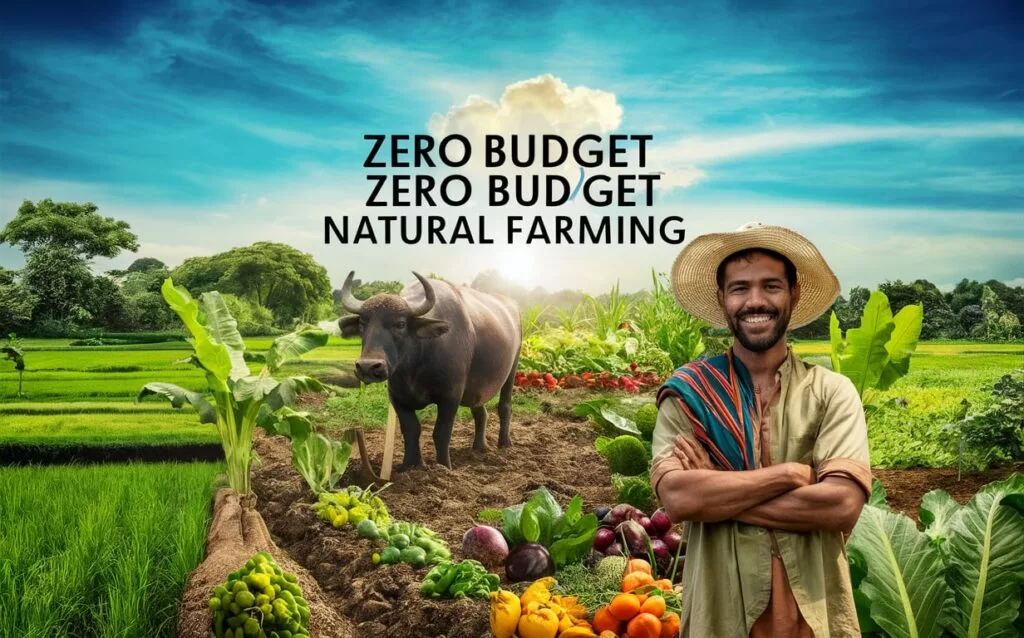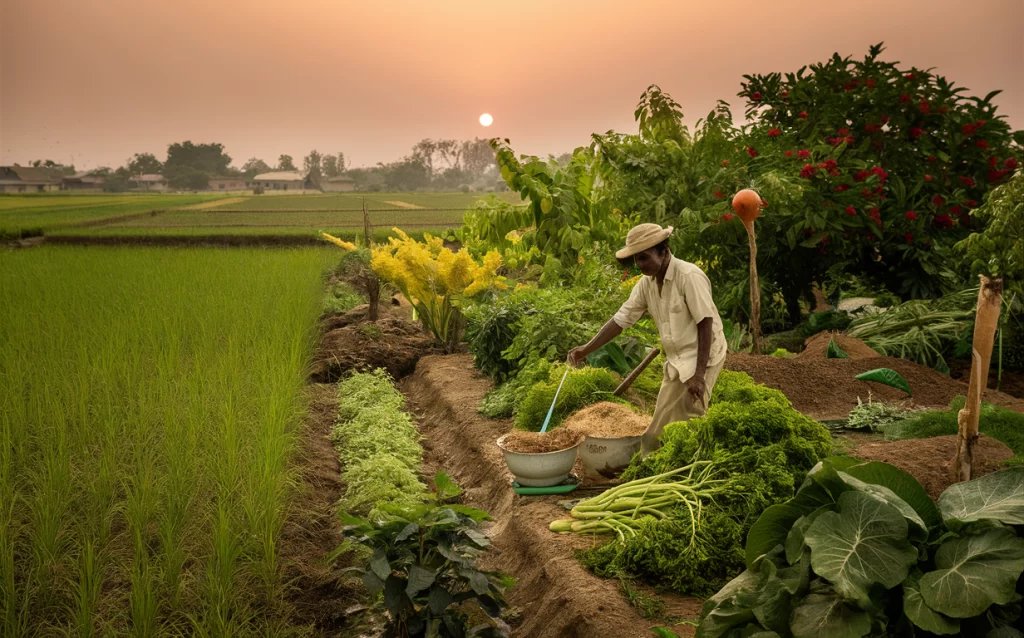What Is Zero Budget Natural Farming? A Sustainable Path for Indian Agriculture
In recent years, a revolutionary farming approach called Zero Budget Natural Farming (ZBNF) has been gaining traction across India. This method promises to address many of the challenges faced by Indian farmers while promoting environmental sustainability and food security. As someone deeply interested in natural and clean food production, I find the principles of Zero Budget Natural Farming both fascinating and promising. Let’s explore what Zero Budget Natural Farming is all about and why it could be a game-changer for Indian agriculture.
Understanding Zero Budget Natural Farming
Zero Budget Natural Farming is an agricultural method developed by Subhash Palekar, an Indian agriculturist. The term “zero budget” refers to the zero net cost of production, as farmers are encouraged to use resources available on their farms rather than purchasing external inputs. “Natural farming” emphasizes working in harmony with nature, eschewing chemical fertilizers and pesticides in favor of natural alternatives.
Key Principles of Zero Budget Natural Farming
- Jivamrita (Microbial Culture): A fermented mixture of cow dung, urine, jaggery, pulse flour, and soil that enhances soil microbial activity.
- Bijamrita (Seed Treatment): A natural seed coating made from ingredients similar to Jivamrita, used to protect seeds from pests and diseases.
- Acchadana (Mulching): Covering the soil with organic matter to conserve moisture and suppress weed growth.
- Whapasa (Soil Aeration): Maintaining a balance of air and water in the soil to promote healthy root development.
These principles form the foundation of ZBNF, aiming to create a self-sustaining ecosystem on the farm.
The Indian Context: Why Zero Budget Natural Farming Matters

India’s agricultural sector faces numerous challenges, including:
- Farmer indebtedness due to high input costs
- Soil degradation from excessive chemical use
- Water scarcity and drought vulnerability
- Climate change impacts on crop yields
ZBNF addresses these issues by promoting low-cost, environmentally friendly farming practices that can potentially increase farmers’ income while improving soil health and crop resilience.
Government Support and Adoption
Recognizing the potential of Zero Budget Natural Farming, several Indian states have begun promoting and implementing this approach:
- Andhra Pradesh has been at the forefront, aiming to convert all its farmers to ZBNF by 2024.
- Himachal Pradesh has also embraced ZBNF, with the state government actively supporting its adoption.
- Other states like Karnataka, Kerala, and Gujarat have shown interest and initiated ZBNF programs.
Benefits of Zero Budget Natural Farming
Economic Advantages
- Reduced Production Costs: By eliminating the need for expensive chemical inputs, ZBNF can significantly lower farmers’ expenses.
- Improved Profitability: Studies have shown that ZBNF can lead to higher net returns for farmers, especially in vegetable-based cropping systems.
- Debt Reduction: Lower input costs mean farmers are less likely to fall into debt traps, a common issue in Indian agriculture.
Environmental Benefits
- Soil Health Improvement: Zero Budget Natural Farming practices enhance soil organic matter content and microbial activity, leading to better soil structure and fertility.
- Water Conservation: Mulching and improved soil structure help retain moisture, reducing irrigation requirements.
- Biodiversity Promotion: Natural farming methods encourage diverse cropping systems and support local ecosystems.
Health and Food Security
- Chemical-Free Produce: Zero Budget Natural Farming results in food free from harmful pesticide residues, promoting better health for consumers.
- Nutritional Quality: Some studies suggest that naturally grown crops may have higher nutritional content compared to conventionally grown produce.
- Food Sovereignty: By reducing dependence on external inputs, Zero Budget Natural Farming can contribute to greater food security and sovereignty for rural communities.
Challenges and Criticisms
While Zero Budget Natural Farming shows promise, it’s not without its challenges and critics:
- Yield Concerns: Some researchers argue that Zero Budget Natural Farming may lead to lower yields, especially in the short term.
- Scientific Validation: More rigorous scientific studies are needed to validate the long-term effectiveness of Zero Budget Natural Farming practices.
- Scalability Issues: Implementing ZBNF on a large scale may face logistical challenges, especially in regions with limited access to indigenous cow breeds.
- Knowledge Gap: Many farmers lack the necessary knowledge and skills to implement Zero Budget Natural Farming effectively, requiring extensive training and support.

Success Stories and Case Studies
Despite the challenges, there are numerous success stories of farmers benefiting from Zero Budget Natural Farming:
Case Study: Andhra Pradesh
In Andhra Pradesh, where Zero Budget Natural Farming has been widely promoted, farmers have reported:
- Reduced input costs by up to 90%
- Increased yields in various crops
- Improved soil health and water retention
- Higher-income and better quality of life
Individual Farmer Experiences
Many individual farmers across India have shared positive experiences with Zero Budget Natural Farming:
- A farmer in Karnataka reported a 20% increase in yield and a 50% reduction in water usage after adopting Zero Budget Natural Farming practices.
- In Gujarat, a group of farmers successfully cultivated cotton using Zero Budget Natural Farming methods, achieving comparable yields to conventional farming with significantly lower costs.
The Way Forward: Integrating Zero Budget Natural Farming into Indian Agriculture
To fully realize the potential of ZBNF in India, several steps are necessary:
- Research and Development: Invest in scientific studies to validate and improve Zero Budget Natural Farming practices.
- Policy Support: Develop policies that incentivize and support farmers transitioning to Zero Budget Natural Farming.
- Education and Training: Establish comprehensive training programs to equip farmers with Zero Budget Natural Farming skills and knowledge.
- Market Development: Create markets for naturally grown produce to ensure fair prices for farmers.
- Collaboration: Foster partnerships between farmers, researchers, and policymakers to address challenges and scale up the adoption of Zero Budget Natural Farming.
Conclusion
Zero Budget Natural Farming represents a promising approach to addressing many of the challenges faced by Indian agriculture. By promoting sustainable, low-cost farming practices, ZBNF has the potential to improve farmers’ livelihoods, enhance environmental sustainability, and contribute to food security. While challenges remain, the growing interest and support for ZBNF at both governmental and grassroots levels suggest a bright future for this innovative farming method.
Key Takeaways
- Zero Budget Natural Farming is a holistic farming approach that emphasizes natural inputs and zero external costs.
- It addresses key challenges in Indian agriculture, including farmer debt and environmental degradation.
- Zero Budget Natural Farming offers economic, environmental, and health benefits to farmers and consumers alike.
- Several Indian states are actively promoting and implementing Zero Budget Natural Farming programs.
- While promising, Zero Budget Natural Farming faces challenges in scientific validation and large-scale implementation.
- Success stories from various parts of India demonstrate the potential of Zero Budget Natural Farming.
- The future of Zero Budget Natural Farming in India depends on continued research, policy support, and farmer education.
As we move towards a more sustainable and health-conscious future, Zero Budget Natural Farming offers a compelling vision for Indian agriculture. By embracing these practices, we can work towards a future where farming is not only economically viable but also in harmony with nature, producing clean, nutritious food for all. Let us support and explore this path for the health of our farmers, our land, and ourselves.
🔬 Reviewed for Scientific Accuracy by:
With over 15 years of academic and clinical experience, Dr. Gautam oversees the scientific and editorial integrity of educational content related to herbs, nutrition, and wellness.
ResearchGate Profile | ORCID
Dr. Khurana brings deep expertise in nutraceutical formulation, phytochemistry, and metabolic health. He reviews FarmPURE content to ensure alignment with evolving biochemical and plant-based research.
ORCID
All FarmPURE Blog content is reviewed by domain experts to ensure it reflects the highest standards of botanical integrity, scientific relevance, and practical guidance. Our mission is to promote better health and beauty through the power of organic herbs, spices, and plant-based wellness solutions.
Disclaimer: The information provided in this blog is intended for general wellness and educational purposes only. It is not a substitute for professional medical advice, diagnosis, or treatment. Dr. Rashmi Gautam and Dr. Nikhil Khurana participate as scientific reviewers only, and do not provide or endorse personalized medical recommendations. Always consult a qualified healthcare provider before making decisions related to your health.

